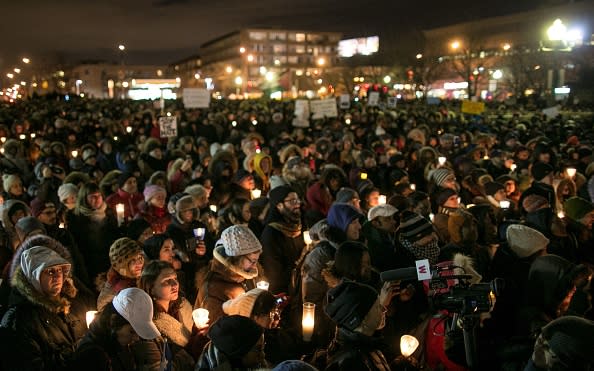Finding light in the darkness of Quebec's mosque shooting

For the civil rights movement, it was a church bombing that killed four African-American girls in Birmingham, Ala., in 1963. And later, the assassination of Martin Luther King Jr.
In the long and ongoing march towards women’s equality, it was the 1989 murders of 14 women at the Ecole Polytechnique in Montreal.
They were moments of violence that changed the conversation. If not immediately, they forced reflection that made change possible.
Now Muslim Canadians can only hope that the murders of six men praying at their Quebec City mosque might be that watershed moment for them — the flicker of hope to be taken from tragedy.
“People are fearful. Many are still in shock. Many of us can’t even believe that this has happened,” Amira Ellghawaby, communication director for the National Council of Canadian Muslims, told Yahoo Canada News.
“At the same time, there is a renewed resolve because finally, after years of many of us talking about Islamophobia, talking about a rise in hate crimes against Muslims … I think this is a moment for all of Canada to say ‘this happened here, in our country, a place where we pride ourselves on a diverse and multicultural community. How is this possible that this happened here?’”
The murders have provoked a lot of soul-searching.
Earlier this week, Joel Lightbound, a Liberal MP, captured the spirit of many Canadians when he stood in the House of Commons and asked for forgiveness from the Muslim community.
“Forgiveness for having watched these last few years their ostracisation and their stigmatization; for having watched taking root in the hearts of my fellow men fear, mistrust and hatred; for having done my best to respond but not having done enough,” Lightbound said.
“Because if words have consequences, silences also have consequences. Never again.”
He implored Muslims to find the strength to do what so many have refused to do for them: “to see through the darkness that hangs over our society to find the light.”
Lightbound received a standing ovation from his fellow parliamentarians.
At a funeral for the victims Thursday Prime Minister Justin Trudeau had a similar refrain.
“As a community and as a country, together we will rise from this darkness stronger and more unified than ever before — that is who we are,” Trudeau told thousands gathered for the memorial.
In the immediate aftermath, Quebec Premier Philippe Couillard admitted xenophobia and racism have haunted his province.
“Words can be knives slashing at people’s consciousness,” he said.
Quebec’s has seen a long-running debate over “reasonable accommodations” for religious and cultural practices.
Those identity politics were at play in the Parti Quebecois’ failed “Charter of Values” legislation in 2013. A few years earlier the National Assembly debated a ban on face veils and a Parti Quebecois member made headlines by calling halal meat contrary to Quebec values.
“Quebec Muslims in particular have really been facing an onslaught of daily Islamophobia on the airwaves, in their papers, online,” Ellghawaby said.
“It’s really unfortunate that it took the deaths of six people for people to realize that the way that an entire community has been stereotyped, ostracized, marginalized for all these years is unacceptable.”
And it’s not just Quebec, she said.
The last federal election saw the Conservative Party of Canada propose a telephone hotline to report “barbaric cultural practices” and featured debate on a niqab ban.
More recently, events in the U.S. have raised the spectre of Islamophobia.
“We certainly think the rise of Donald Trump perhaps has helped to give people even more permission to espouse hateful views,” Ellghawaby said.
A survey of Muslim Canadians by the Environics Institute last year found one in three reported having experienced discrimination in the previous five years and 62 per cent said they were worried or somewhat worried about discrimination.
Two-thirds were concerned about the portrayal of Muslims in the media.
Ellghawaby said the words of Lightbound and other political leaders have been a welcome respite.
“I do hope this is a moment for all of us, as members of a diverse community… if you hear hatred against any person or any group, it really is incumbent on you to say something and stop it because it’s harmful. It harms not just the person immediately targeted but it harms the social fabric.”


